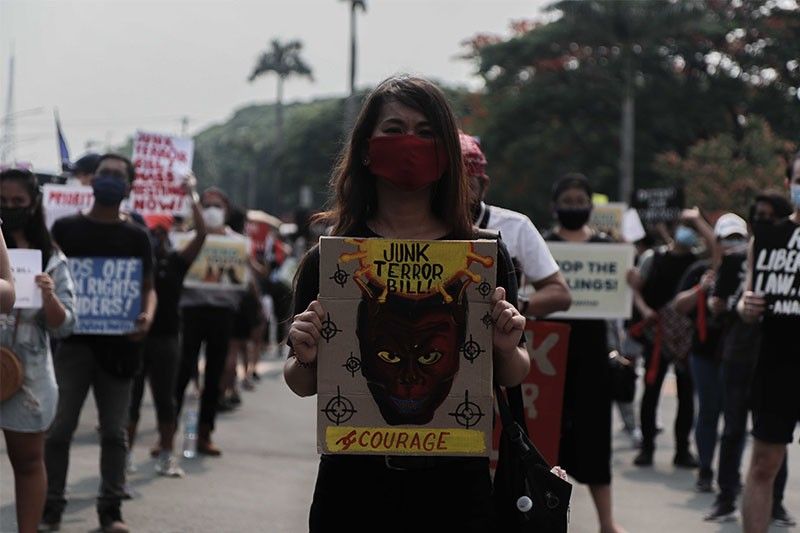UN rights office wary anti-terror bill will 'erode constitutional, legal protections'

MANILA, Philippines — The United Nations human rights office expressed concern over the controversial anti-terrorism bill, which critics fear will worsen the human rights situation in the Philippines.
The proposed Anti-Terrorism Act of 2020, which is now up for President Rodrigo Duterte’s signature, is among the “worrying new law and amendments […] which risk eroding constitutional and other legal protections,” the UN Office of the High Commissioner on Human Rights said in a report released Thursday.
“The proposed 2020 Anti-Terrorism Act, slated to replace the already problematic Human Security Act, dilutes human rights safeguards, broadens the definition of terrorism and expands the period of detention without warrant from three to 14 days, extendable by another 10 days,” the UN rights office said.
“The vague definitions in the Anti-Terrorism Act may violate the principle of legality,” it added.
Human rights lawyers have expressed alarm over what they said are unconstitutional provisions in the proposed legislation that seek to punish acts "which are in no way terrorism." They also warned it could be used against critics and members of the opposition because of the broadness and vagueness of definition of terrorism.
The bill, if passed into law, would also give members of the executive branch power to designate individuals and groups as terrorists.
Lawmakers, as well as the Department of the Interior and Local Government that will help implement the Anti-Terrorism Act when it becomes a law, have stressed that there are enough safeguards against abuse.
“The UN human rights mechanisms have already expressed concerns about the current law that it gives too much discretion to authorities and the definition of terrorism is too broad. Now this proposed anti-terrorism law makes it much worse,” Ravina Shamdasani, who led the crafting of the UN report, said in a press briefing Thursday afternoon.
READ: DILG: Anti-Terror Bill will not be used to silence dissent
Vilification of dissent ‘institutionalized, normalized’
The UN human rights office also said in its report that the vilification of dissent and attacks against perceived critics of the government are being “increasingly institutionalized and normalized in ways that will be very difficult to reverse.”
It stressed that "red-tagging" — labelling people and groups as communists or terrorists — has been a “persistent and powerful threat” to civil society and freedom of expression.
In October 2019, human rights monitor Karapatan told Philstar.com that more individuals and organizations have been subjects of red-tagging since Duterte signed Executive Order 70, which created the National Task Force to End Local Communist Armed Conflict.
Karapatan itself has been accused of being a front organization for communist rebels, an allegation that it says puts its rights workers in more danger.
The group said red-tagging by government forces is usually followed by threats through electronic or physical means, surveillance and harassment, arbitrary or illegal arrest and detention, or torture. In some cases, red-tagging also translates to enforced disappearances and even-killings.
“These vague definitions [of the Anti-Terror Act of 2020] may violate the principle of legality under international law and they are very worrying. Now, you add to this the context in the Philippines where a lot of human rights organizations are routinely labelled as terrorists. This is very worrying,” Shamdasani said.
- Latest
- Trending
































